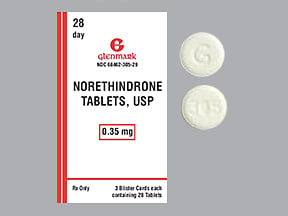Norlyda is a limited distribution medication.

Norlyda Coupons & Savings Card – Discount Prices from $21.30
Brand for: Norethindrone
Norethindrone is a progestin-only birth control pill, commonly known as the "mini-pill," designed to prevent pregnancy. It is suitable for individuals who cannot take estrogen. This medication works mainly by thickening the cervical mucus, which blocks sperm movement, and altering the uterine lining to make it less favorable for a fertilized egg to implant. In some cases, it also prevents ovulation. Norethindrone is taken daily at the same time each day to maximize its effectiveness, which is generally higher than methods like condoms or diaphragms but less than combination hormonal contraceptives. It is important to note that this medication does not offer protection against sexually transmitted infections such as HIV. Users may experience side effects like irregular bleeding, headaches, and nausea. Always consult with a healthcare professional before starting any new medication to ensure it is appropriate for your specific health needs.
Our Norlyda coupons are free to use. You can print the coupon, email it to yourself, or receive the Norlyda coupon via text message. To get your free discount, show the pharmacist your Norlyda savings card which has the discounted coupon price. Use our filters below to edit the prescription box to match your needs. The Norlyda prices will update based on your prescription needs. Above our Norlyda coupons, you can change the location to see pharmacy prices in other areas. Our prescription discount card will update online with the specific pharmacy costs associated with your edits. Be sure to text, email, or print the Norlyda savings card code that you need after editing the prescription box and location field. Show the discount card to your pharmacist before paying.
My prescription
Edit
0.35MG, Norethindrone (84 Tablets)
Select pharmacy

CVS
$29.76
COUPON PRICE
Albertsons
$21.30
COUPON PRICE
Walgreens
$24.44
COUPON PRICE
Walmart
$47.33
COUPON PRICENorlyda savings card
Show this card to your pharmacist
Albertsons
$21.30
BIN
ID
PCN
GRP
011867
LHD76B8AD0
HT
LABH001
Powered by
Norethindrone is a progestin-only birth control pill, commonly known as the "mini-pill," designed to prevent pregnancy. It is suitable for individuals who cannot take estrogen. This medication works mainly by thickening the cervical mucus, which blocks sperm movement, and altering the uterine lining to make it less favorable for a fertilized egg to implant. In some cases, it also prevents ovulation. Norethindrone is taken daily at the same time each day to maximize its effectiveness, which is generally higher than methods like condoms or diaphragms but less than combination hormonal contraceptives. It is important to note that this medication does not offer protection against sexually transmitted infections such as HIV. Users may experience side effects like irregular bleeding, headaches, and nausea. Always consult with a healthcare professional before starting any new medication to ensure it is appropriate for your specific health needs.
Our Norlyda coupons are free to use. You can print the coupon, email it to yourself, or receive the Norlyda coupon via text message. To get your free discount, show the pharmacist your Norlyda savings card which has the discounted coupon price. Use our filters below to edit the prescription box to match your needs. The Norlyda prices will update based on your prescription needs. Above our Norlyda coupons, you can change the location to see pharmacy prices in other areas. Our prescription discount card will update online with the specific pharmacy costs associated with your edits. Be sure to text, email, or print the Norlyda savings card code that you need after editing the prescription box and location field. Show the discount card to your pharmacist before paying.
Norlyda (Norethindrone) dosage forms
Use our Norlyda (Norethindrone) 0.35MG coupon with prices from $22.51 for 84 Tablets. You can also use our Norlyda (Norethindrone) 0.35MG coupon with prices from $11.61 for 28 Tablets.
Dosage Quantity Price from Per unit 0.35MG 84 Tablets $22.51 $0.27 0.35MG 28 Tablets $11.61 $0.41
| Dosage | Quantity | Price from | Per unit |
|---|---|---|---|
| 0.35MG | 84 Tablets | $22.51 | $0.27 |
| 0.35MG | 28 Tablets | $11.61 | $0.41 |
Norlyda FAQs
What is the drug Norlyda used for?
Norlyda is used as a form of birth control to prevent pregnancy. It is a progestin-only oral contraceptive, often referred to as the "mini-pill." It may also be prescribed for other conditions as determined by a healthcare provider.
Using the SaveHealth discount card, what is the price of Norlyda without insurance?
Using the SaveHealth discount card, the price of Norlyda without insurance is $21.30.
What is the price of Norlyda at CVS?
The price of Norlyda at CVS is $29.76.
What is the price of Norlyda at Walgreens?
The price of Norlyda at Walgreens is $24.44.
What is the price of Norlyda at Walmart?
The price of Norlyda at Walmart is $47.33.
